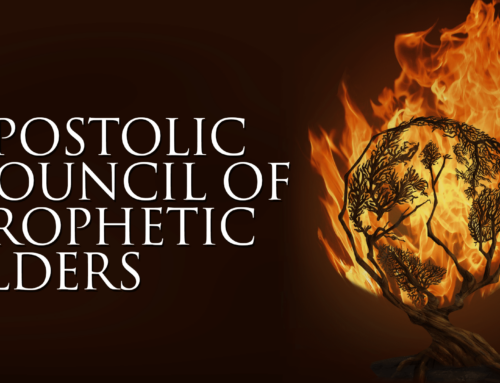Are there any absolutes? Any standards or parts of the moral code that do not change? Most of the world seems to think that we are becoming more enlightened as time goes on, and that this means we must leave old standards behind. In the Western world, “inclusiveness” reigns supreme.
If you stand for absolutes, you are accused of being old-fashioned and not progressive enough. Even some Christians accuse other believers who hold to absolutes of having a “religious spirit” and of not understanding true love, mercy, and grace. Well, I guess, count me in!
I, for one, am here to say that absolutes have not changed in God’s inspired, authoritative Word, the Bible. You can trust the God of the Word, and you can trust the Word of God.
The Bible — So Much More
Let’s take a fresh look at God’s Word, starting out with the words of Jesus the Word, as recorded in the Word!
The Authoritative Word
The disciple John wrote down Jesus’ reply to a group of Jewish men who were unhappy with Him because He had called Himself the Son of God, which they considered blasphemy.
Has it not been written in your Law, “I said, you are gods”? If he called them gods, to whom the word of God came (and the Scripture cannot be broken), do you say of Him, whom the Father sanctified and sent into the world, ‘You are blaspheming,’ because I said, “I am the Son of God”? (John 10:34–36)
 I want you to notice how Jesus referred to the Word here. First, He called it “your Law.” By that, He meant the Scriptures as the Jews knew them—the books that we call the Old Testament. The “Law,” in other words, did not refer only to the first five books of our Bible, known to Jews as the Torah, but also to all the rest of the books that had been collected as Scripture to date, including the Psalms. “The Law” was a broad term for the whole collection, referring to a wider range of books than just the ones that laid down rules and regulations.
I want you to notice how Jesus referred to the Word here. First, He called it “your Law.” By that, He meant the Scriptures as the Jews knew them—the books that we call the Old Testament. The “Law,” in other words, did not refer only to the first five books of our Bible, known to Jews as the Torah, but also to all the rest of the books that had been collected as Scripture to date, including the Psalms. “The Law” was a broad term for the whole collection, referring to a wider range of books than just the ones that laid down rules and regulations.
Then Jesus said of the psalmist and the psalmist’s original audience, “If…
[these] to whom the word of God came….” Thus, we can see that Jesus recognized that the Psalms and the rest of the known Scriptures were the very “word of God.”
So, within two related sentences, Jesus referred to the “Law,” “the word of God,” and “the Scripture,” all three being equivalent. The word “Scripture” means “that which is written.” From this, we learn that the Bible does not contain the entire knowledge of God but rather is the authoritative portion of the vast spoken words of God for humankind that has been recorded in writing.
Inspired by the Holy Spirit
The entire Word of God has been inspired directly by the Spirit of God, as we read in Paul’s letter to Timothy (he was referring solely to our Old Testament, since the New Testament was just beginning to be written then): “All scripture is given by inspiration of God, and is profitable for doctrine, for reproof, for correction, for instruction in righteousness” (2 Timothy 3:16 kjv). The word translated “inspiration of God” is the Greek word theopneustos, which means “divinely breathed in,” “God-breathed,” or “inspired by God.” Theopneustos is derived from two other Greek words: theos, meaning “God,” and pneo, meaning “to blow,” or “to breathe hard.” The word pneo is also connected to the Greek word for “spirit,” pneuma, which literally means “wind” or “breath.”
Again, this Spirit-inspired Book will take the warp out of our lives. It will set our course straight and keep us from deviating from the path of righteousness. Light comes into your soul when you read the words of the Bible. If you put it away and stop looking at it, darkness can reenter your soul; but the more you keep this Book in front of you, the more training in righteousness you receive.
Moved by the Holy Spirit
Not only has the Holy Spirit inspired the written Word, but He also inspires fresh words to this day. Such words never carry the same level of authority as the written Word, but that does not invalidate them. It’s just that, as Peter and John wrote, the Spirit must verify any word from God and help us to understand it.
But know this first of all, that no prophecy of Scripture is a matter of one’s own interpretation, for no prophecy was ever made by an act of human will, but men moved by the Holy Spirit spoke from God. (2 Peter 1:20–21)
We need confirmation and direction from the written Word, which we can trust is thoroughly God-directed. The Greek word in the passage from 2 Peter that is translated “moved by” can also be rendered “directed their course by [had their course directed by]” or “borne along by.” It’s like sailing: Without the wind (we could say Wind), the sailboat doesn’t go anywhere.
 God controlled the human “vessels” who wrote the Scriptures by the interplay of His divine Spirit with their spiritual, emotional, mental, and physical faculties. When the Spirit breathed on them, they were blown out of the natural realm into the supernatural. They sailed over into revelation.
God controlled the human “vessels” who wrote the Scriptures by the interplay of His divine Spirit with their spiritual, emotional, mental, and physical faculties. When the Spirit breathed on them, they were blown out of the natural realm into the supernatural. They sailed over into revelation.
The Purified Word
By the time the Psalms were written, people had long been creating valuable objects out of silver. When the silver came out of the ground, it was impure, mixed with other elements. After being mined, each lump of stuff would be purified in a clay furnace or oven. David had that in mind when he wrote this line about God’s words:
The words of the Lord are pure words, like silver tried in a furnace of earth, purified seven times. (Psalm 12:6 nkjv)
The furnace made of earth (clay) represents the human element, while the silver represents the divine message. The fire ensures the absolute purity of the silver—that is, the message—and the notation “seven times” indicates the complete and perfect work of the Holy Spirit. (Seven is considered the number of completion or perfection.) Therefore, the Holy Spirit, while burning inside human hearts, overruled human frailties and errors in producing the divine message of Scripture.
The Consistency of Scripture
It’s been settled––the Word of the Lord, that is: “Forever, O Lord, Your word is settled in heaven”(Psalm 119:89). When the psalmist wrote that line, he wanted to emphasize that the Word of God is not a product of time but of eternity. Eternity goes both ways—clear back to Genesis 1 (and beyond), and forward to the heavenly drama of John’s Revelation (and beyond).
This was the testimony of Jesus, as well. He said, “Heaven and earth will pass away, but My words will not pass away” (Matthew 24:35). Even if all the elements of heaven or earth pass away, His words will hold firm; they cannot be destroyed. They stand through all the tests of time and eternity. No cataclysmic event or ignorant interpretation can obliterate God’s words. Forever, they remain as the standard of life.
Such was Jesus’ confidence in the effectiveness and strength of the written Word that He selected certain Scriptures to cut down the lying temptations of Satan. During His forty-day wilderness sojourn, He confronted the devil’s temptations with direct quotes from Scripture. Each time, He said, “It is written…” and proceeded to quote a line from the book of Deuteronomy. (See Matthew 4:1–11; Luke 4:1–13.)
Even Satan did not deny the absolute authority of Scripture. This shows us that the darkest evil is under subjection to the Word of God, which should be good news to those who adhere to the Scriptures.
“That the Scripture May Be Fulfilled”
 Even when we have not yet seen a particular fulfillment with our own eyes, we can trust that the words foretelling it are true.
Even when we have not yet seen a particular fulfillment with our own eyes, we can trust that the words foretelling it are true.
Jesus knew all the Scriptures that pointed to Him as the Messiah, and after His resurrection, He cited them on the road to Emmaus to two of His downcast disciples, who hadn’t yet recognized who He was. “Then beginning with Moses and with all the prophets, He explained to them the things concerning Himself in all the Scriptures” (Luke 24:27).
The prophets whose words are recorded in the Old Testament specifically and accurately predicted each of the following incidents in the earthly life of Jesus the Messiah: His birth to a virgin mother at Bethlehem, His flight into Egypt, His home in Nazareth, His anointing by the Holy Spirit, His ministry in Galilee, His healing of the sick, the rejection by the Jews of His teaching and miracles, His use of parables, His being betrayed by a friend, His being forsaken by His disciples, His being hated without a cause, His being condemned along with criminals, His garments’ being parceled out by lot to others, His being offered vinegar to quench His thirst on the cross, His body’s being pierced without His bones being broken, His burial in a rich man’s tomb, and His resurrection from the dead on the third day. Again and again, the Word proves true.
You Can Trust the God of the Word
The earthly life of Jesus was guided in every aspect by the authority and prophetic influence of God’s Word. The Word of God is cohesive, complete, and all-sufficient. From Genesis to Revelation, it unfolds the nature and consequences of sin, along with the way of deliverance from sin and its consequences—through faith in the Lord Jesus Christ. As we heed these words and obey them, we will find and receive true, abundant, and eternal life.
Let the consistency and reliability of the Scriptures encourage you as you think about knowing God better, because He obviously makes Himself known in countless ways, and the Bible is one of His primary means. He is not hiding or keeping Himself remote and secret.
Instead of neglecting the written Word out of apathy or ignorance of its value, we need to devour it, if we want to know its Author. Let the Word of God be your companion and friend. Believe me, there will always be something new to discover in it—for the rest of your life!
Great News, indeed! You have a lifetime to spend getting to know God by getting to know His Word.
Enjoying the Journey,
James W. Goll
 This article is an excerpt from the book, Passionate Pursuit – Getting to Know God and His Word, available in our online store.
This article is an excerpt from the book, Passionate Pursuit – Getting to Know God and His Word, available in our online store.







Leave A Comment
You must be logged in to post a comment.